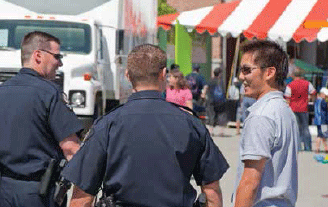
Over the past 30 years, policing has made the challenging move from an occupation to a profession. The advancements in the uses of technology, heightened requirements in hiring processes, higher levels of training and development, increased community and government collaboration, and the overall grasp of the community policing philosophy have all been key factors in this professional maturation. Unfortunately, while law enforcement in the United States has probably never been better than it is today, as evidenced by decreasing crime trends and the millions of interactions annually without controversy, the public trust and confidence in the job the police are doing has not increased at the same pace. Police officers have probably never been better at what they do, but they have also perhaps never been less respected by some of their constituents. Practitioners must ask themselves how to meet the challenge of aligning the perceived legitimacy of police agencies with the advancements in the profession. Perhaps, the solution will be found when all agencies embrace a community policing (and, at the city level, community governance) philosophy as the vehicle in which to achieve this alignment.


